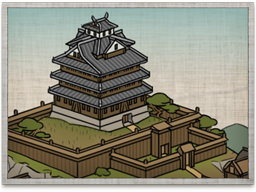Difference between revisions of "Fortress (TWS2)"
m |
m |
||
| (One intermediate revision by the same user not shown) | |||
| Line 6: | Line 6: | ||
<li>[[Yari Ashigaru Garrison (TWS2 Unit)|Yari Ashigaru Garrison]]</li> | <li>[[Yari Ashigaru Garrison (TWS2 Unit)|Yari Ashigaru Garrison]]</li> | ||
<li>[[Bow Ashigaru Garrison (TWS2 Unit)|Bow Ashigaru Garrison]]</li> | <li>[[Bow Ashigaru Garrison (TWS2 Unit)|Bow Ashigaru Garrison]]</li> | ||
| − | |Basic Building Statistics=<li>+6 to repression in this province</li> | + | |Basic Building Statistics=<li>Cost: 3200</li> |
| − | <li>Unlocks an additional construction slot</li> | + | <li>+6 to repression in this province</li> |
| + | <li>Unlocks an additional construction slot (Construction Slots: 3)</li> | ||
<li>+8% to the replenishment rate in this province</li> | <li>+8% to the replenishment rate in this province</li> | ||
<li>Consumes food: 3</li> | <li>Consumes food: 3</li> | ||
Latest revision as of 22:14, 6 November 2012
| Fortress (TWS2) | |
|---|---|
 | |
| Chain | Castle Type |
| Requires | Buildings: |
| Enables | Buildings: |
| Spawned Defence Forces | Units: |
| Basic Building Statistics | |
| Clan Effects | |
| See main article; FotS Buildings | |
Description
Without sure footing, the sword stroke will go amiss.
To properly defend and govern a province, a daimyo requires a strong base. That a fortress also inspires respect, even fear, among his people is no bad thing either. A fortress represses a province by its presence, helps the tax yield, and increases the fame of a clan, as rivals and enemies are awed by its construction. Any garrison can hold out against enemy attacks, and the castle acts as a centre for recruiting troops.
The development of castle design coincided with the rise in importance of the warrior classes in Japan. Warfare grew in scale, and the castle also grew so it could withstand prolonged sieges; the traditional wooden fortifications could no longer be expected to hold out against large armies with siege engines. The Hojo clan was responsible for the defences of Odawara, built in 1416. The castle survived two sieges before it finally fell in 1590 to Toyotomi Hideyoshi. Odowara was actually the central defensive position of a network of castles, as it was surrounded by smaller, satellite fortresses. Some of them, in turn, had their own ring of satellite forts. The entire system provided a layered defence that was extremely difficult and time-consuming for an enemy to reduce.